 |
|||||||||




 |
|||||||||





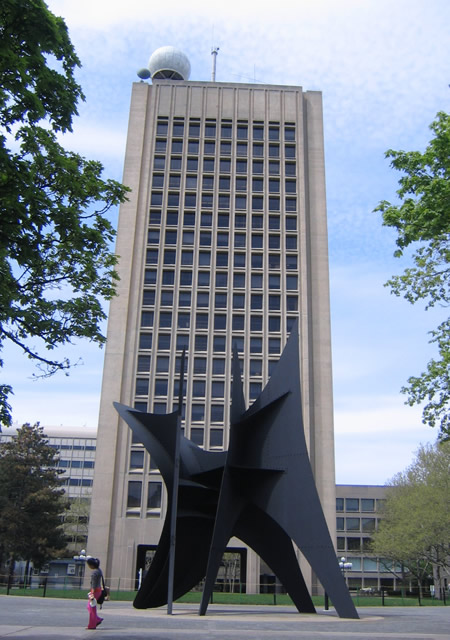
Photo: A building at MIT (Massachusetts Institute of Technology) Campus, Cambridge, Massachusetts.
LONDON, March 4, 2020 — QS Quacquarelli Symonds, a global higher education think-tank, today released the tenth edition of the QS World University Rankings by Subject. This ranking is an extensive guide to the performance of more than 13,000 individual university programs, taken by students at 1368 universities, in 83 locations worldwide, across 48 academic disciplines, and in five broad Faculty Areas.
• Massachusetts Institute of Technology is the world-leader in 12 subject tables - more than any other institution. Harvard University leads in 11 subjects, while the University of Oxford leads eight tables.
Key trends include:
• The United Kingdom’s university programs have recorded an overall year-on-year improvement, with more rises (306) than drops (238);
• The number of top-50 programs - those ranking in the top 50 for their subject - offered by American universities has decreased from 806 in 2018 to 769 in 2020;
• Mainland China records 100 top-50 programs for the first time, though its universities’ rate of improvement is slowing;
• The National University of Singapore is Asia’s best-performing institution: 8 of its programs rank among the global top-10;
• India’s universities begin recording moderate improvements, with 53 programs improving and only 29 declining: there is also an increase in the number of top-50 and top-100 programs provided by Indian higher education;
• Russia’s higher education system has continued to improve, with an increase in top-50 and top-100 programs;
• Latin America’s best-performing overall system is Colombia, while the continent’s leading individual institutions are Universidad Nacional Autónoma de México (12 top-50 programs) and Brazil’s Universidade de São Paulo (11 top-50 programs).
|GlobalGiants.Com|
Edited & Posted by the Editor | 3:12 PM | View the original post
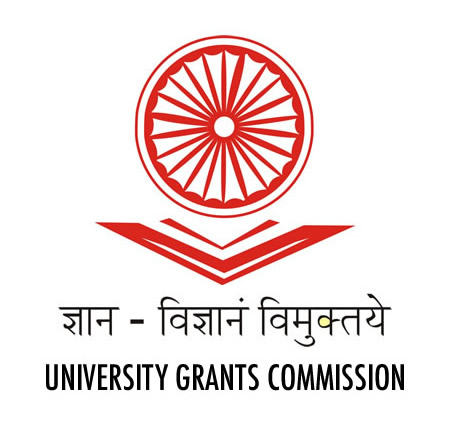
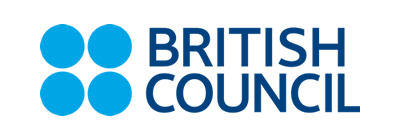
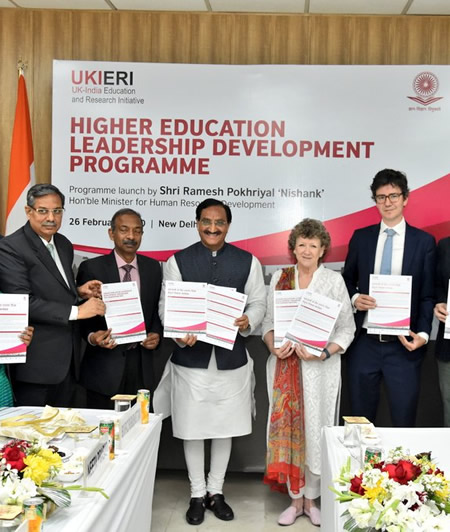
New Delhi, February 26, 2020 — The Union Minister for Human Resource Development, Ramesh Pokhriyal Nishank, today launched the ‘Higher Education Leadership Development Programme for Administrator.’ It is a joint initiative of the University Grants Commission (UGC) and the British Council under the auspices of the UK India Education and Research Initiative. Mr. Amit Khare, Secretary, MHRD; Prof. D.P. Singh, Chairman, UGC; Ms. Barbara Wickham OBE, Director, British Council India, and other officials from the Ministry of Human Resource Development, University Grants Commission and the British Council were present during the launch of the program.
HRD Minister Pokhriyal said that this is a unique program that will address the critical aspect of enhancing leadership capacity in the mid and senior level functionaries of Indian Universities. He said that the program would be a step towards institutional development in line with our Governments’ commitment to improving the quality of education imparted in our Universities. He added that the program would lead to developing a more global outlook and promote learning for inclusive and internationally connected higher education systems. The Minister also said that the program would serve as a stimulant for the functionaries to improve their performance and capabilities, which consequently shall enhance the institutional profile and reputation of Universities in India.
• The main objective of the program is to train the senior and middle-level academic administrators to enable them to bring about systemic changes with renewed approaches, capacity, tools, and skills in Universities in India. The “Higher Education Leadership Development Programme for Administrators” would ensure effectiveness on the part of the administrative functionaries of the Universities.
• The program includes two workshops conducted by UK trainers, which will train about 300 academic administrators in the level of Registrar and Joint/Deputy/Assistant Registrar to enable them to bring about professional transformation in the higher education institutions. Further, to make the program sustainable, 30 potential future leadership development program trainers from among the 300 participants will be chosen and will be given additional training to train others.
The University Grants Commission (UGC) will conduct this program in collaboration with ‘Advance HE’ as the training partner with globally recognized institutional expertise and leadership excellence from the UK, which is being enabled by the British Council in India.
The UGC has issued the following notification in this connection:
“INVITATION OF APPLICATIONS FROM UNIVERSITIES FOR HIGHER EDUCATION LEADERSHIP DEVELOPMENT PROGRAMME FOR ADMINISTRATORS”
WHO CAN APPLY
• Central Universities funded by the University Grants Commission.
• State Public Universities included under section 2(f) & 12B of the UGC Act.
TARGET GROUP
• Administrative functionaries at the level of Registrar and Joint/Deputy/Assistant Registrar of the eligible Universities.
HOW TO APPLY
• Eligible Universities shall apply in the prescribed format.
• Eligible Universities shall nominate 3-5 functionaries in order of preference at the level of Registrar and Joint/Deputy/Assistant Registrar.
• To ensure gender diversity in the program, at least one of the top three nominees should be a female.
• The application should be duly forwarded and signed by the Vice-Chancellor/authorized signatory of the university.
• The last date for receipt of the application is March 16, 2020.
PROCEDURE FOR SELECTION
• The UGC would assess the application based on criteria such as Participating Institution’s commitment to the program; Experience, achievements, and potential of the participants; Clarity of program goals; Potential impact of the program; and Sustainability and transferability beyond the curriculum.
• The names of the selected universities and participants, along with the schedule of training, shall be announced by the end of March 2020.
Full notification and the prescribed format for application are available from the UGC.
• For any further query, universities may write to the UGC or directly contact Mr. Mriganka Sekhar Sarma, Education Officer, International Cooperation, UGC.
|GlobalGiants.Com|
— Incidentally, the Editor is a Member of the Association of University Administrators, UK.
Union HRD Minister, Shri @DrRPNishank launched 'Higher Education Leadership Development Programme for Administrator’- a joint initiative of UGC and British Council under the auspices of UK India Education and Research Initiative (#UKIERI) today in New Delhi. @inBritish pic.twitter.com/jXVJECNsh0
— Ministry of HRD (@HRDMinistry) February 26, 2020
Edited & Posted by the Editor | 11:24 AM | View the original post

Photo: Flags of the Member States of the World Intellectual Property Organization (WIPO) on display at the WIPO Headquarters in Geneva. Copyright © WIPO. Photographer: Emmanuel Berrod. Image provided by WIPO. [File Photo]
CHANDIGARH, India, February 22, 2020— The World Intellectual Property Organization (WIPO), Geneva, Switzerland, informs that Asia accounted for more than two-thirds of all patent, trademark, and industrial design applications in 2018. China boosted the overall growth in demand for intellectual property (IP) rights. The United States of America (US) maintained its supremacy in patent applications filed in export markets.
“Asia continues to outpace other regions in filing activity for patents, trademarks, industrial designs, and other intellectual property rights. And these intellectual property rights are at the center of the global economy,” said WIPO Director General Francis Gurry. “China alone accounted for almost half of all the world’s patent filings, with India also registering impressive increases. Asia has become a global hub for innovation.”
China’s IP office received the highest number of patent applications in 2018. A record of 1.54 million applications amounts to 46.4% of the global total. IP offices of the US (597,141), Japan (313,567), the Republic of Korea (209,992), and the European Patent Office (174,397) followed China’s IP office. Together, these five offices accounted for 85.3% of the world’s total.
Germany (67,898), India (50,055), the Russian Federation (37,957), Canada (36,161) and Australia (29,957) also featured among the top 10 offices. All of these offices saw growth in filings, ranging from 7.5% in India to 0.3% in Germany.
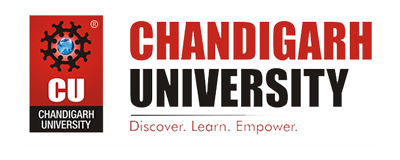
• In India, Chandigarh University has emerged as one of the country’s best educational institutions that have filed the maximum number of patent applications in 2018-19. “We are contributing towards making India self-reliant in developing new technologies and getting a top position in Global Innovation Index,” the University said.
The latest data released by the government of India’s Office of Controller General of Patent Design and Trademarks for the year 2018-19 tells that Chandigarh University had the highest number, 336 patents, filed by its students and faculty. IITs, 23 of them, had jointly filed 557 patents, followed by 336 patents by Chandigarh University alone. India’s leading IT company Tata Consultancy Services (TCS), followed Chandigarh University with 239 patent applications. The fourth position in this list is held by the Council of Scientific and Industrial Research (CSIR) with 202 patents. Bharat Heavy Electricals Limited (BHEL), a Public Sector Company, got the fifth rank by filing 135 patents.
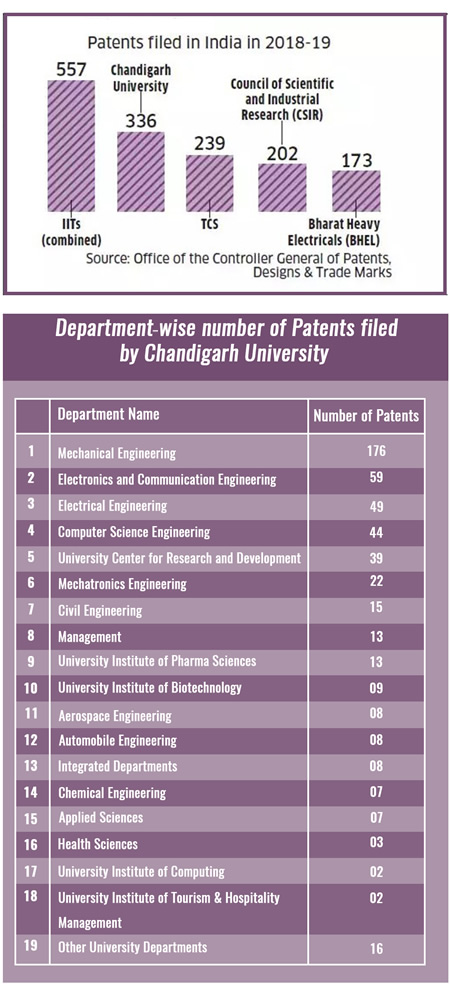
Photo: Detailed Chart Showing the Number of Patents filed by Chandigarh University. Image provided by Chandigarh University.
While giving details about the patents filed by Chandigarh University students and faculty, its Vice-Chancellor said, “Department of Mechanical Engineering leads the university departments with 176 patents filed. The Department of Electronics and Communication Engineering follows it with 59 patents and the Department of Computer Science with 44 patents.” “The students and faculty of Bio-Technology and Pharmacy have filed more than 25 patents in the field of Health Sciences and Medicine, which is yet another way of contributing towards society”, the Vice-Chancellor remarked.
“Higher Education Institutions or Universities have a major role to play in the field of research which contributes towards the economic prosperity of any nation,” said Satnam Singh Sandhu, Chancellor of Chandigarh University. “We at Chandigarh University, through our intensive R&D initiatives, are trying to convert the ‘Make in India’ dream turn into a reality so that our country no longer has to be dependent on developed nations for the transfer of technology. The robust work of our Core Research Groups increased the number of patents filed by Chandigarh University from 336 to 500 in 2019.” he added.
According to Chandigarh University, its campus hosts more than 30 ultra-modern R&D Labs and Innovation Centers established by leading companies like Microsoft, Hewlett Packard, SAP Labs, IBM, Honda, Hyundai, Volvo-Eicher, Virtusa, IHG Academy, The Taj Academy, and Piramal Foundation. Here students are given hands-on practical exposure to the new age technologies under the guidance of Industry Experts. The University has earmarked an annual budget for Research & Innovation.
The National Assessment and Accreditation Council of India (NAAC) has awarded Chandigarh University with the prestigious ‘A+’ Grade. The institution offers more than 109 undergraduate and postgraduate programs in the field of engineering, management, pharmacy, law, architecture, journalism, animation, hotel management, commerce, and other disciplines.
|GlobalGiants.Com|
— The World Intellectual Property Organization (WIPO) is a specialized agency of the United Nations that works to protect intellectual property throughout the world.
—The Editor is an Alumnus of the World Intellectual Property Organization (WIPO) Academy, Geneva, Switzerland.
Edited & Posted by the Editor | 7:31 AM | View the original post
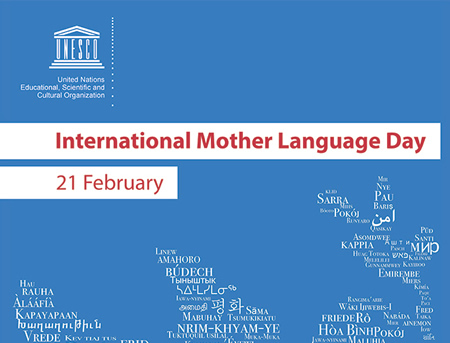
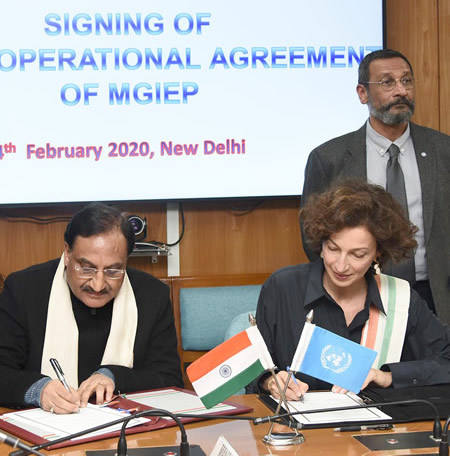
Photo: The Union Minister for Human Resource Development, Dr. Ramesh Pokhriyal ‘Nishank’ and the Director-General, UNESCO, Ms. Audrey Azoulay signing an agreement during their meeting in New Delhi on February 04, 2020.
New Delhi, February 18, 2020 — The Ministry of Human Resource Development (MHRD) will celebrate the International Mother Language Day (Matribhasha Diwas) on February 21 across the country. The Vice President of India, M. Venkaiah Naidu, will be the Chief Guest at the main event to be held in New Delhi on February 20, 2020. Human Resource Development Minister Ramesh Pokhriyal Nishank will be the Guest of Honour. The theme of the program is ‘Celebrating our Multilingual Heritage’ reflecting the spirit of “Ek Bharat Shreshth Bharat.”
International Mother Language Day (IMLD) is a worldwide annual observance forming a part of UNESCO’s calendar of events, held on February 21 to promote awareness of linguistic and cultural diversity and multilingualism. UNESCO first announced it on November 17, 1999. It was formally recognized by the United Nations General Assembly (UNGA) in 2008. The latter called upon its member states “to promote the preservation and protection of all languages used by people of the world.”
MHRD, along with educational institutions and language institutions, is celebrating International Mother Language Day (Matribhasha Diwas) for the past three years. This year also the educational institutions will organize activities like Elocution, Debating, Singing, Essay Writing, Painting, Music, Dramatic Performances, Exhibitions, and Cultural Events.
India has unparalleled linguistic and cultural diversity. Therefore the Government of India has decided to celebrate International Mother Language Day (Matribhasha Diwas) every year. The government would promote the use of mother tongues to achieve the following objectives:
Meanwhile, India’s University Grants Commission (UGC) has asked all Universities and Colleges to celebrate International Mother Language Day (Matribhasha Diwas) on February 21, 2020.
“In case the colleges are closed on February 21, 2020, on account of Mahashivaratri, they may celebrate it a day earlier or a day after February 21, 2020. They should upload the report on the celebration of the occasion on the UGC Activity Monitoring Portal by February 22, 2020, 5 P.M.” the UGC notification said.
|GlobalGiants.Com|
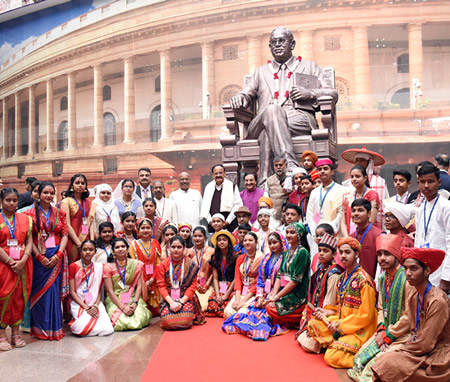
Photo: The Vice President of India, M. Venkaiah Naidu, with the students in traditional Indian attires who had welcomed him in 22 Indian languages, on the occasion of Mother Language Day, in New Delhi on February 20, 2020. The Union Minister for Human Resource Development, Dr. Ramesh Pokhriyal’ Nishank’ and the Minister of State for Culture and Tourism, Prahlad Singh Patel, are also present.
Edited & Posted by the Editor | 5:24 AM | View the original post
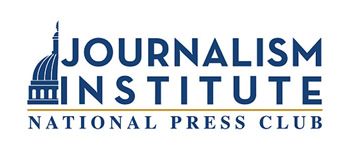
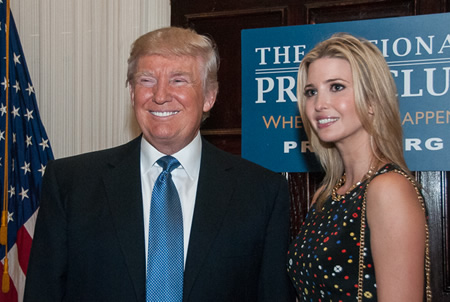
Photo: Donald Trump and his daughter Ivanka pose before his luncheon address to the National Press Club, May 27, 2014. Image Credit: Al Teich / National Press Club. [File Photo]
WASHINGTON, DC, February 15, 2020 — The National Press Club has announced that its Journalism Institute would organize a workshop where three accomplished reporters would show how to get the “government records you always wanted but weren’t quite sure how to find.”
As a reporter, filing a Freedom of Information Act request should be your last resort. The government documents you need may be hiding in plain sight, the Club Announcement said.
The Freedom of Information Act (FOIA) is a federal law that requires the United States government to fully or partially disclose information and documents controlled by it upon specific request.
The U.S. states have analogous freedom of information laws. A FOIL (Freedom of Information Law) request to the New York State, for instance, is similar to an FOIA request to the U.S. Federal Government.
The FOIL/FOIA Workshop will take place on Wednesday, February 19, at:
National Press Club
529 14th Street NW
13th Floor, Conference Rooms
Washington, DC 20045.
Panelists:
• Jerry Zremski, Washington Bureau Chief for the Buffalo News.
Zremski will share tactics from his dogged coverage of Rep. Chris Collins’ investments, which led him to a pump-and-dump scheme that caught the attention of federal prosecutors. Zremski will describe how he uses available public records to connect dots and track the work of the congressional delegation he covers for his readers.
• Alex Mann, Crime and Courts Reporter for the Capital Gazette in Annapolis.
Mann has pursued a case in the Capital Gazette newsroom. Mann will discuss how to use court records to keep abreast of a running story, how to discover new ones, and how to question any document that is declared confidential.
• Alison Fitzgerald Kodjak, Investigative Editor for the Associated Press.
Kodjak has covered money in politics, the financial crisis, the BP oil spill, and health care policy by digging through government agency records. Kodjak will share tips that fueled her award-winning coverage at the National Public Radio, the Center for Public Integrity, and as a reporter at Bloomberg News, the Philadelphia Inquirer, and the Palm Beach Post.
The National Press Club Journalism Institute promotes an engaged global citizenry through an independent and free press. It equips journalists with skills and standards to inform the public in ways that inspire civic engagement. As the non-profit affiliate of the National Press Club, the Institute serves as a beacon for journalism in the public interest.
The National Press Club, the world’s leading professional organization for journalists, represents more than 3,000 reporters, editors, and expert communicators worldwide.
|GlobalGiants.Com|
The Editor is a Member of the National Press Club, Washington, DC.
Edited & Posted by the Editor | 3:40 AM | View the original post
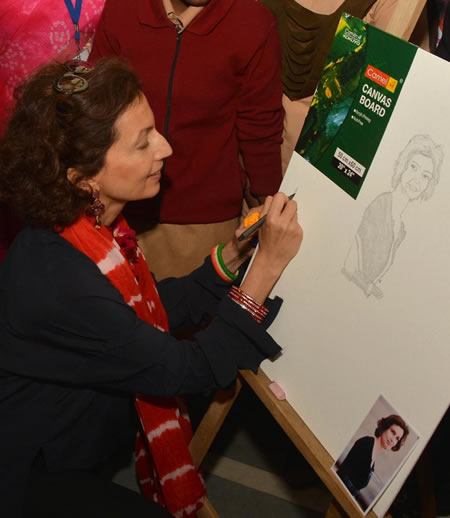
Photo: Amer, Rajasthan, India, February 05, 2020. The students of Government Girls Senior Secondary School in Amer, Rajasthan, presented the UNESCO Director-General her pencil sketch showcasing their promising artistry.
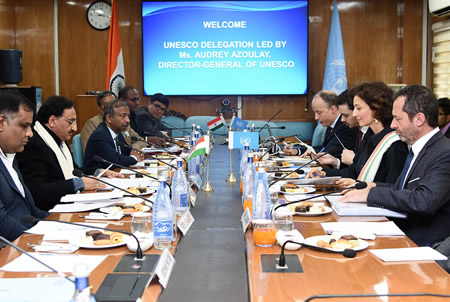
Photo: The Director-General, UNESCO, Ms. Audrey Azoulay meeting the Union Minister for Human Resource Development, Dr. Ramesh Pokhriyal Nishank, in New Delhi. February 04, 2020.
New Delhi, February 06, 2020 — The Director-General of UNESCO, Ms. Audrey Azoulay, has commended India for successfully promoting the education of girls in the country. On a three-day official visit to India, Ms. Azoulay spoke to the media today. She said that India had influenced the vision and objectives of UNESCO through the legacy of Mahatma Gandhi. She expressed confidence that India and UNESCO would carry forward this relationship further to realize their shared goals. Terming her earlier meeting with the Minister of Human Resource Development, Ramesh Pokhriyal Nishank, as a very fruitful one, she said she was delighted to see India’s efforts at making quality education available to every section of the society.
Ms. Azoulay noted India’s work with satisfaction and said that India’s role is crucial for the realization of the Sustainable Development Goals. She appreciated the programs for the management skills of teachers. She was also pleased with India’s efforts at ensuring inclusion in education and the use of technology in this field.
The Director-General of UNESCO, Ms. Audrey Azoulay, is in New Delhi for a three-day visit to India from the 4th to February 06, 2020. Her visit re-emphasizes India’s close ties with UNESCO. She visited the city of Jaipur yesterday.
The Director-General also called upon Prime Minister Narendra Modi during her visit.
|GlobalGiants.Com|
Edited & Posted by the Editor | 10:36 PM | View the original post
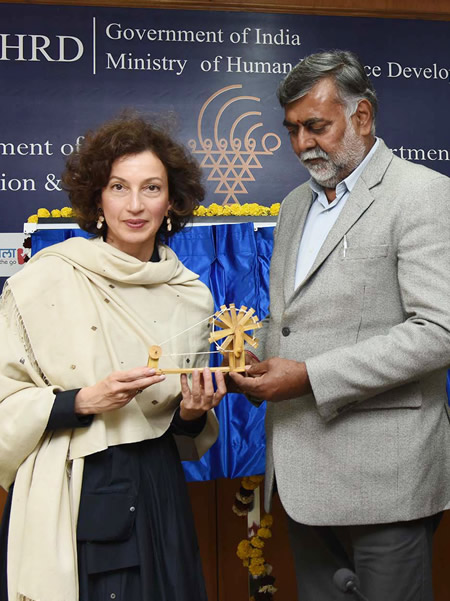
Photo: India’s Minister of State for Culture and Tourism, Prahalad Singh Patel, presenting the souvenir Charkha (Spinning Wheel) to the Director-General of UNESCO, Ms. Audrey Azoulay, in New Delhi on February 04, 2020.
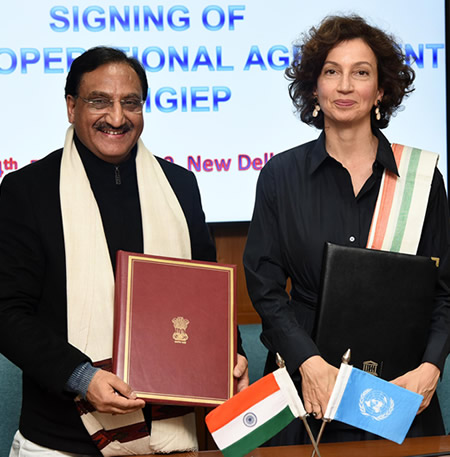
Photo: The Union Minister for Human Resource Development, Dr. Ramesh Pokhriyal’ Nishank’, and the Director-General of UNESCO, Ms. Audrey Azoulay, signing the second operational agreement of MGIEP, during their meeting, in New Delhi on February 04, 2020.
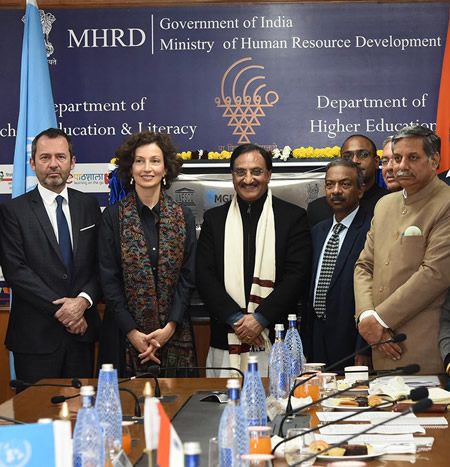
Photo: The Director-General of UNESCO, Ms. Audrey Azoulay, met with the Union Minister for Human Resource Development of India, Dr. Ramesh Pokhriyal’ Nishank’, in New Delhi on February 04, 2020. Other dignitaries, including the Higher Education Secretary and the UGC Chairman, were also present.
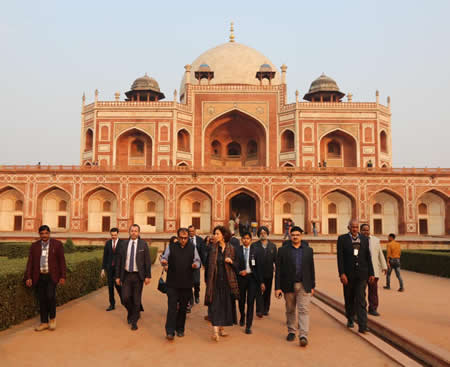
Photo: The Director-General of UNESCO, Ms. Audrey Azoulay, visits Humayun’s tomb in Delhi. Humayun’s tomb was declared a UNESCO World Heritage Site in 1993.
Ms. Audrey Azoulay is in New Delhi for a three-day visit to India from the 4th to February 06, 2020. India enjoys close ties with UNESCO since its inception in 1946 and shares with it the ethos of the promotion of peace and intercultural dialogue.
|GlobalGiants.Com|
Edited & Posted by the Editor | 10:17 AM | View the original post
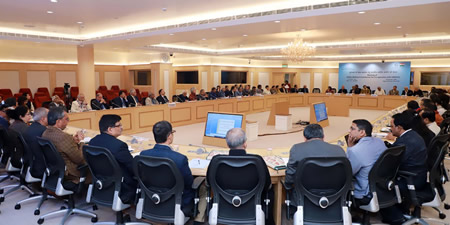
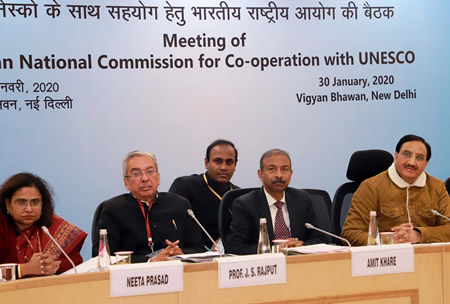
Photos: The Minister for Human Resource Development of India, Dr. Ramesh Pokhriyal’ Nishank’, chairs the meeting of the Indian National Commission for Cooperation with UNESCO (INCCU), in New Delhi on January 30, 2020.
New Delhi, January 30, 2020 — Union Human Resource Development Minister, Ramesh Pokhriyal’ Nishank’, chaired the meeting of the Indian National Commission for Cooperation with UNESCO (INCCU) in New Delhi today. The Representative of India to the Executive Board of UNESCO, J.S Rajput, Secretary HRD cum Secretary General of INCCU, Amit Khare, members of the INCCU, and senior officials of the Ministry also attended the meeting.
The membership of the National Commission consists of members of five Sub Commissions, namely, Sub Commission for (i) Education (ii) Natural Sciences (iii) Social Sciences (iv) Communication (v) Culture. The members of the Sub Commissions briefed the chair about the activities carried out by their respective Sub Commissions.
Mr. Pokhriyal said that the National Commission could play a dominant role in coordinating the activities of the institutions under each of the five sub-commissions so that India’s efforts and achievements get outstanding support, acknowledgment, and recognition across countries. Our work needs to be projected more at the international level so that we can contribute more towards the fulfillment of the objectives of UNESCO while also strengthening India’s image globally.
The Minister said that India is one of the founding members of UNESCO and has always played an active role in promoting its ideals and objectives in the fields of education, culture, communication, natural sciences, and social and human sciences. He added that the Government of India is fully committed to the attainment of 2030 Sustainable Development Goals, and every Ministry is making considerable efforts in this direction.
Mr. Pokhriyal further highlighted that in the field of education, India is working to further UNESCO’s objective of making quality education available to everyone. The Government of India has taken many steps to improve access, equity, and quality of education. A New Education Policy is on the anvil. The Ministry has formulated the new plan after the largest ever process of consultation with stakeholders.
The Minister further said that in the culture sector, UNESCO’s programs aim to promote, preserve, and safeguard cultural heritage and spread respect for all cultures. India has an unparalleled heritage - both tangible and intangible. He added that the Ministry of Culture and the institutions under it are working to preserve the tangible and intangible heritage of the country.
He also said that India has been playing a very positive role in the field of Science by promoting scientific programs and policies as platforms for development and cooperation. He further said that India also supports UNESCO’s works towards freedom of expression, which is a critical condition for democracy and development.
Mr. Pokhriyal said that our National Commission needs to be stronger and more active. It would help showcase the excellent work we are doing and get better representation for India.
The Director-General of UNESCO, Ms. Audrey Azoulay, would be visiting India from 4th to 7th of next month.
|GlobalGiants.Com|
Union HRD Minister, Shri @DrRPNishank attended the Indian National Commission for Cooperation with #UNESCO (INCCU) today in Delhi where he highlighted the importance of promoting the Gandhian values of peace and non-violence to build a culture of sustainable peace in the world. pic.twitter.com/kjBTM3rNzN
— Ministry of HRD (@HRDMinistry) January 30, 2020
Edited & Posted by the Editor | 1:12 PM | View the original post
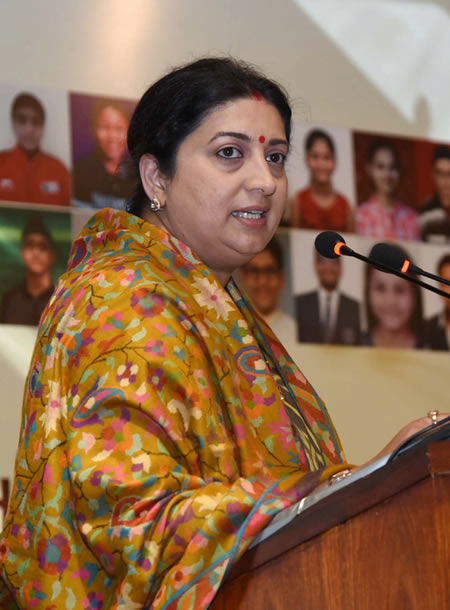
Photo: The Union Minister for Women & Child Development, Smriti Irani, addressing a press conference in New Delhi on January 23, 2020.

New Delhi, January 24, 2020 — On the occasion of the National Girl Child Day, the Ministry of Women and Child Development, with the assistance of the University Grants Commission (UGC), is going to set up 10 Chairs in different fields to carry out research activities to encourage women.
The initiative is called the “Establishment of Chairs in the Universities in the Name of Eminent Women Administrators, Artists, Scientists, and Social Reformers.” The main objective is to inspire women to pursue higher education and to achieve excellence in their area of work. This initiative of highlighting and celebrating women achievers of the country will motivate young girls and women towards higher studies, the Government said.
The Chairs proposed by UGC and approved by the Ministry are as under:
Subject: Proposed Name of Chair
The financial implications of the proposal are Rs. 50 lakh per Chair per year and the total expenditure for establishing ten Chairs will be approximately Rupees five crore per annum. The Chairs are to be created for five years initially as per the guidelines.
Academic functions of the Chairs will be to engage in research and, in turn, contribute to the advancement of knowledge in the area of the study. The Chairs would strengthen the role of the University and the academics in public policymaking and design. Further, they would execute short-term capacity-building programs for teachers in higher education focused on the designated discipline of the Chair.
The other academic functions of the Chairs will be to provide a forum for Inter-University, Inter-College, Post Graduate and Research level dialogues and discussion meetings. The Chairs would also promote conferences seminars, summer & winter schools, and publication of articles, research papers, reports, books, and monograms. Additionally, each Chair would facilitate participation in teaching and the Ph.D. programs of the associated Department or School.
While the University Grants Commission (UGC) would, from time to time, review the Chair for its continuance, the related University would review the progress of the Chair annually and submit a final report on the activities and outcome of the Chair to the UGC.
The UGC had issued the following public notice in this connection:
• PUBLIC NOTICE •
UGC is going to establish Ten (10) Chairs in different Universities in the name of Eminent Women Academicians, Administrators, Artists, Scientists, Environmentalists, and Social Reformers funded by the Ministry of Women and Child Development, Government of India.
The eligible Universities desirous of setting up Chairs may send the detailed proposal containing the intended activities and academic function of the Chair, including the annual budget, to:
Dr. Jitendra Kumar Tripathi
Joint Secretary (Chairs)
Room No. 323
University Grants Commission
Bahadurshah Zafar Marg
New Delhi 110002.
• All the universities qualified to receive grant-in-aid from the UGC are eligible to apply for the establishment of Chairs.
• The proposal submitted should be duly signed (with stamp) by the Registrar of the University.
• The proposal should reach the UGC within 21 days from the date of issue of this Public Notice.
• Proposals received after the last date will not be considered.
• An Expert Committee would examine the proposals and select the Universities for setting up the Chairs.
|GlobalGiants.Com|
On #NationalGirlChildDay, I am pleased to share that @MinistryWCD has entrusted @ugc_india to establish 10 Chairs in the names of eminent women who have achieved major breakthrough in the fields of academics, art, science, environment, administration & social development. pic.twitter.com/YqobnpFxRH
— Smriti Z Irani (@smritiirani) January 24, 2020
Edited & Posted by the Editor | 12:16 PM | View the original post

New Delhi, 21 January 2020 — The University Grants Commission (UGC), the higher education regulator in India, has asked the universities to abide by the provision of Section 22 of the UGC Act 1956 and award only such degrees as have been specified by the UGC.
In a letter sent to all the Vice-Chancellors on 20 January 2020, the Commission said that it had observed that some universities/institutions are awarding unspecified degrees leading to litigations and complex problems for the students conferred with such degrees. Further explaining the position, the Commission, in its letter, has mentioned the following provisions:
• The right of conferring or granting degrees shall be exercised only by a university established or incorporated by a or under a Central Act, a Provincial Act, or a State Act; or an institution deemed to be university under Section 3; or an institution specially empowered by an Act of Parliament to confer or grant degrees.
• Save as provided in sub-section (1), no person or authority shall confer, or grant, or hold himself or itself out as entitled to confer or grant any degree.
• For the Section, ‘degree’ means any such degree as may, with the previous approval of the Central Government, be specified in this behalf by the Commission by notification in the Official Gazette.
If a university wishes to award a degree other than the one specified by the UGC, it should approach the UGC for its approval six months before starting the degree program with a full explanation on the course it is launching, the letter from the Commission stated.
|GlobalGiants.Com|
Edited & Posted by the Editor | 11:58 PM | View the original post
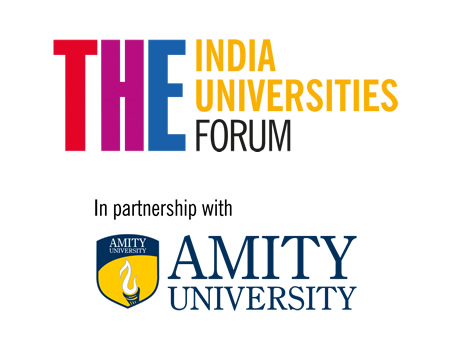
New Delhi, January 5, 2020 — The inaugural Times Higher Education (THE) India Universities Forum will bring together leaders from higher education, industry, and government to Amity University in Noida to discuss some of the current key challenges and opportunities that universities on the sub-continent face.
THE India Universities Forum would examine current collaborations and future opportunities for Indian universities to build close working relationships with international faculty, students, and postgraduates. It would also explore the best models of internationalization in the broader Asian context, and how Indian universities can emulate such associations.
With best-practice examples and contributions from industry and government representatives, the forum will also discuss how higher education institutions can best develop an entrepreneurial outlook to attract industry research income.
Additionally, the forum will examine how universities can drive the agenda to become key players in innovation ecosystems by establishing and stimulating collaboration between researchers and partners from industry, business, and external organizations.
A data masterclass will examine the latest Times Higher Education data on the performance of Indian universities and provide an in-depth presentation on the rankings within an Indian context. The forum will welcome an open dialogue on the most effective methodologies and the impact of international rankings on higher education development in India.
Prominent speakers include Phil Baty, Chief Knowledge Officer, Times Higher Education (THE); Way Kuo, President, City University of Hong Kong; and Nicholas Dirks, former Chancellor, University of California, Berkeley.
|GlobalGiants.Com|
Edited & Posted by the Editor | 4:56 AM | View the original post
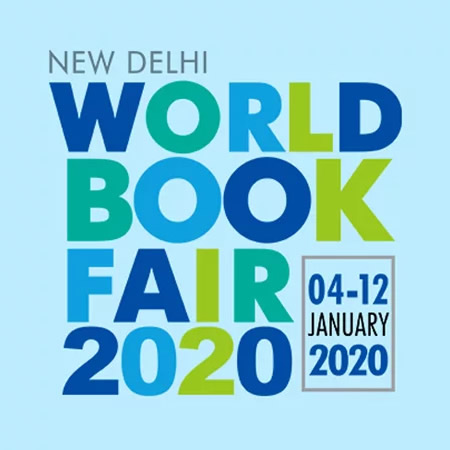
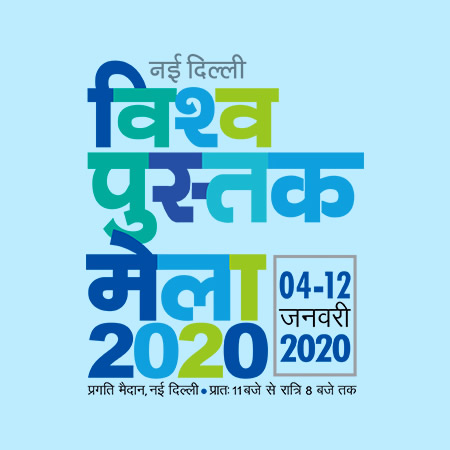
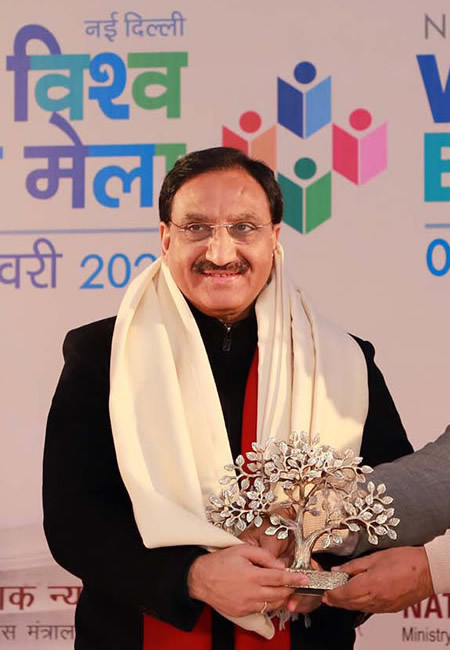
Photo: The Union Minister for Human Resource Development, Dr. Ramesh Pokhriyal Nishank, at the inauguration of the New Delhi World Book Fair, at Pragati Maidan, in New Delhi on January 04, 2020.
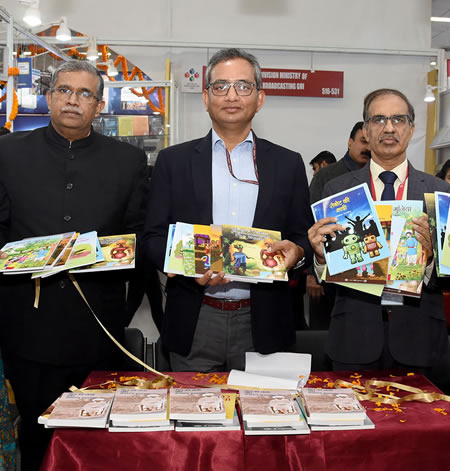
Photo: The Additional Secretary, Ministry of Information & Broadcasting, Atul Kumar Tiwari, at the stall of the Publications Division, during the New Delhi World Book Fair, at Pragati Maidan, in New Delhi on January 04, 2020.
New Delhi, January 04, 2020 — Union Human Resource Development Minister, Ramesh Pokhriyal Nisank, inaugurated the 28th edition of New Delhi World Book Fair 2020 at Pragati Maidan in New Delhi today.
Mr. Pokhriyal said that we are in the midst of the ocean of books filled with thoughts. Thoughts give power to humanity. He said that this book fair is a place where people meet each other and generate and share new ideas.
The Minister appreciated the fact that the New Delhi World Book Fair is arguably Asia’s most significant book fair, and he was hopeful that this Fair would soon become the world’s biggest book fair.
Over 15 countries including Abu Dhabi, China, Denmark, Egypt, France, Germany, Iran, Nepal, Poland, Saudi Arabia, Sharjah, Spain, Sri Lanka, UK, and the USA, are participating in the Foreign Pavilion at the Fair.
New Delhi World Book Fair also provides a platform for B2B activities for publishers from India and abroad. These B2B sessions include CEO Speak, a Publishers Forum to be organized in association with FICCI on January 05, 2020, the New Delhi Rights Table, and a 2-day event to be held on 6 & 7 January 2020. Over 40 publishers from India and abroad will participate in the New Delhi Rights Table. The organizers will hold a National Conclave on Readership and Book Promotion on January 08, 2020, and a Business Meet with Trade Partners on January 09, 2020.
NBT (National Book Trust) has been playing a significant role in promoting Indian books and authors abroad. NBT regularly participates in major international book fairs like Sharjah International Book Fair, London Book Fair, and Frankfurt Book Fair. Recently, India was the Guest of Honour country at Abu Dhabi International Book Fair held in April 2019 and at Guadalajara International Book Fair, Mexico, in November 2019. India will also be Guest of Honour country at the forthcoming Paris Book Fair in March 2020.
At the Children’s Pavilion, several activities like seminars, panel discussions, storytelling sessions, workshops on creative writing, and illustrations, among others, will be organized to promote books and reading amongst children and young adults.
This year, the theme of the New Delhi World Book Fair 2020 is ‘Gandhi: The Writers’ Writer’ to commemorate the 150th Birth Anniversary celebrations of Mahatma Gandhi. Mahatma Gandhi was a prolific writer, editor, publisher, printer, and institution builder. He wrote extensively in Gujarati, Hindi and English languages. The theme is an attempt to give booklovers a glimpse of how Mahatma Gandhi, a great strategic communicator, inspired and influenced generations of writers and how the writers understood and emulated Gandhi in words.
Some of the well-known writers like Anirban Ganguly, Bhawana Somaya, Kevin Missal, Madhulika Dutta, Manoshi Sinha Rawal, Sudha Murthy, Sumit Dutt Majumdar, among others will engage in lively banters with the visitors at Authors’ Corners. There will be three unique Corners, which include International Events Corner (Hall No. 7A), Reflections (Hall No. 8), and Lekhak Manch (Hall No. 12).
During the Fair, there would be various literary events, discussions, conversations with authors & scholars, book release functions, children’s activities, cultural programs, and film screenings. Well-known speakers, such as Dr. Rakesh Pande, Dr. Varsha Das, Shri Aflatoon, Shri Avinash Dudhe, Shri Firoz Khan, Ms. Fouzia Khan, Shri Suresh Sharma, Shri Rajeev Shrivastava, Shri Rajeev Raj, Ms. Shashiprabha Tewari, Prof. Akhtarul Wasey, Prof. Rizwan Kaisar, Dr. M William Bhaskaran, Dr. T Ravichandran, Dr. Sachidanand Joshi, former Justice Narendra Chapalgaonkar, Ms. Deena Patel, Shri Annamalai, and Dr. Sumer Singh Siddhu, among others, would participate in the programs.
|GlobalGiants.Com|
Delhi World Book Fair starts today!
— Ministry of HRD (@HRDMinistry) January 4, 2020
Head over to Pragati Maidan and pick a few books written by your favourite authors..
Also, tag a friend you wish to take along with you, because a fair is always better with friends! 📕📕
Isn’t it?#WBF2020 pic.twitter.com/95jC7pJDP2
Edited & Posted by the Editor | 10:59 AM | View the original post
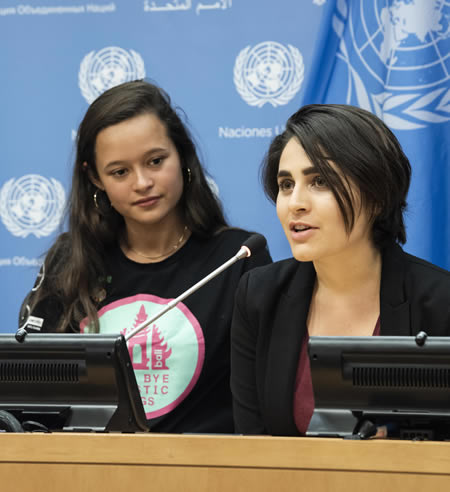
Photo: Marina Melanidis, Youth leader and Co-director of Youth for Nature, speaks at the press conference on the United Nations Educational, Scientific and Cultural Organization (UNESCO) Youth for Nature-Based Solutions. At left is Melati Wijsen, Climate Activist. 21 September 2019. United Nations, New York. UN Photo/Kim Haughton. [File Photo]
New York, NY, 19 December 2019 — The UN General Assembly resolution ‘Education for Sustainable Development in the framework of the 2030 Agenda for Sustainable Development’, introduced by the Group of 77 and China, calls upon the international community to scale up education for sustainable development to achieve the 2030 Agenda. The decision relates to various aspects of culture for sustainable development. It recognizes the gendered barriers faced by girls in accessing education, and the need to deliver quality education to children in conflict and post-conflict situations.
With the adoption of the resolution, the international community has recognized UNESCO’s mandated role in leading and coordinating the Education 2030 Agenda and its position as the lead agency for education for sustainable development.
The resolution emphasizes the importance of further developing and implementing educational programs to address climate change challenges. The decision also notes the significant progress made by the Global Action Programme that has exposed 26 million learners to education for sustainable development curricula and trained two million educators in this domain.
The UN General Assembly has asked UNESCO to assist the Member States in their efforts to promote education for sustainable development. The UN Secretary-General would submit a report on the implementation of the current resolution to the General Assembly at its seventy-sixth session.
|GlobalGiants.Com|
Edited & Posted by the Editor | 10:33 AM | View the original post
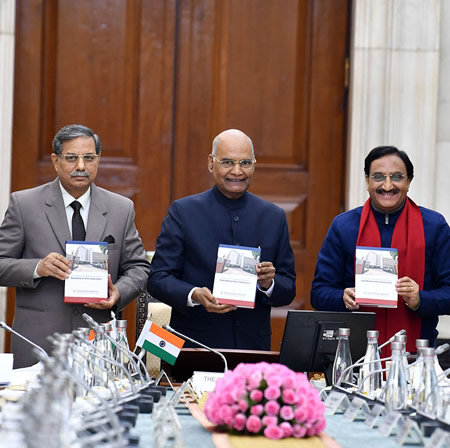
Photo: The President of India, Ram Nath Kovind, at the Conference of Vice-Chancellors of Central Universities in New Delhi on December 17, 2019. On the left is the Chairman, University Grants Commission of India (UGC), Prof. D. P. Singh, and on the right is the Union Minister for Human Resource Development, Dr. Ramesh Pokhriyal Nishank.
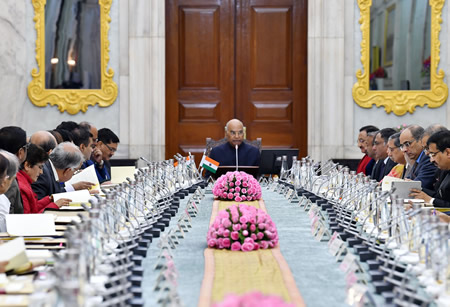
Photo: The President of India, Ram Nath Kovind, addressing the Conference of Vice-Chancellors of Central Universities in New Delhi on December 17, 2019.
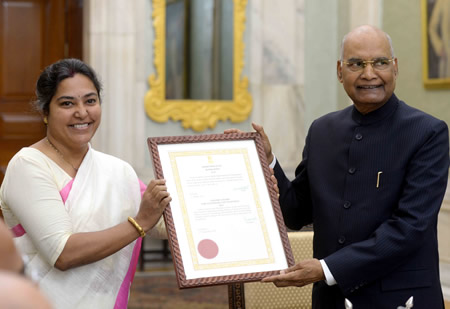
Photo: The President of India, Ram Nath Kovind, presenting the 5th Visitor’s Awards, 2019, at the Conference of Vice-Chancellors of Central Universities, at Rashtrapati Bhavan, in New Delhi on December 17, 2019.
New Delhi, December 17, 2019 — The President of India, Ram Nath Kovind, hosted a Conference of Vice-Chancellors of Central Universities, Directors of IISERs, and Indian Institute of Science Bengaluru, today at Rashtrapati Bhavan. During the inaugural session of the Conference, the President presented the 5th Visitor’s Awards.
The Visitor’s Award - for Research in Humanities, Arts and Social Sciences was presented to Prof. Sibnath Deb from the Department of Applied Psychology, Pondicherry University; for Research in Physical Sciences was presented to Prof. Sanjay Puri from the School of Physical Sciences, Jawaharlal Nehru University; for Research in Biological Sciences was jointly presented to Prof. Asad Ullah Khan from the Inter-disciplinary Biotechnology Unit, Aligarh Muslim University, and Dr. Partima from the Special Centre for Nanoscience, Jawaharlal Nehru University. The President conferred the Visitor’s Award for Technology Development to Dr. Shaon Ray Chaudhuri from the Department of Microbiology, Tripura University.
The President said that the objective of our central universities should be to continually grow and upgrade themselves to the best of global standards. It is here that Vice-Chancellors and Directors have to provide leadership. As an immediate goal, they should strive to become the best in the country and healthily compete with each other. After that, they must aspire to compete with the best in the world. But to achieve the levels where they can compete, they must collaborate amongst themselves, other state and private universities, and learn from the experiences of each other.
The President stated that as leaders of universities and institutions, Vice-Chancellors and Directors are also mandated to develop leadership qualities in their students. He noted that beyond classrooms and labs, students should be encouraged to take up socially-oriented ventures through NSS or other clubs. He said that developing meaningful linkages between the academic community and local industry should be a top priority. Students must be encouraged to emerge as job-creators rather than job-seekers.
Later, addressing the concluding session of the Conference, the President said that universities and higher educational institutions should play a leading role in addressing the specific challenges faced by our nation and our society. Many of these challenges require creative and innovative solutions. It is their paramount duty to ensure that their campuses emerge as spaces that nurture free expression and ideas, where experimentation is encouraged. Failure is not ridiculed but seen as learning. Also, universities should become the laboratories for exposing students to the problems concerning nation-building.
The President stated that students should be encouraged to take up academic and extra-curricular work with a distinct community orientation. He urged universities to make a conscious effort to integrate community-oriented projects as part of their curriculum.
|GlobalGiants.Com|
President Kovind hosts a Conference of Vice-Chancellors of Central Universities, Directors of IISERs and IISc Bengaluru; says it is their paramount duty to ensure that their campuses emerge as spaces that nurture free expression and ideas. https://t.co/N58lOWRoiA pic.twitter.com/oxlA8T768L
— President of India (@rashtrapatibhvn) December 17, 2019
Edited & Posted by the Editor | 11:05 AM | View the original post
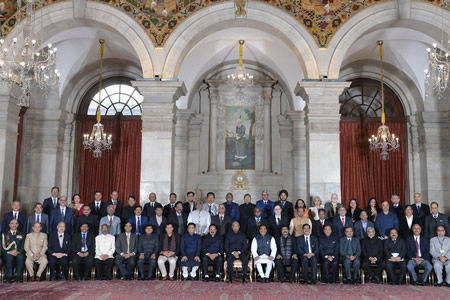
Photo: The President of India, Ram Nath Kovind, with the Vice-Chancellors, Directors, and heads of various Central Institutes of Higher Learning, at Rashtrapati Bhavan, in New Delhi on December 14, 2019.
|GlobalGiants.Com|
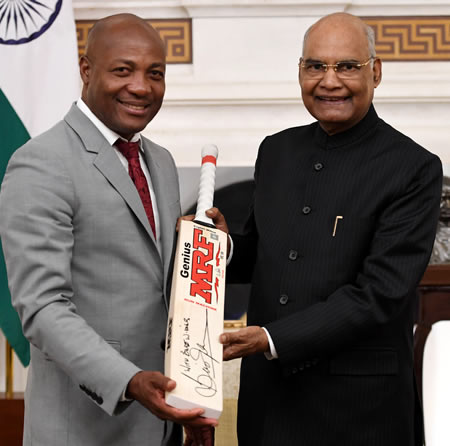
Photo: Legendary Cricketer, Brian Lara, calling on the President, Ram Nath Kovind, at Rashtrapati Bhavan, in New Delhi on December 16, 2019.
|GlobalGiants.Com|
Edited & Posted by the Editor | 11:16 AM | View the original post
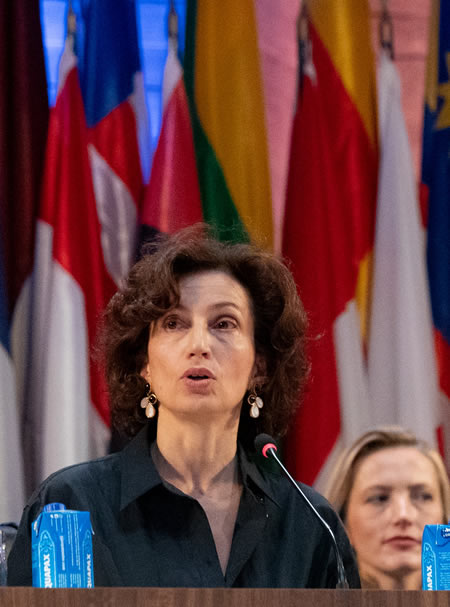
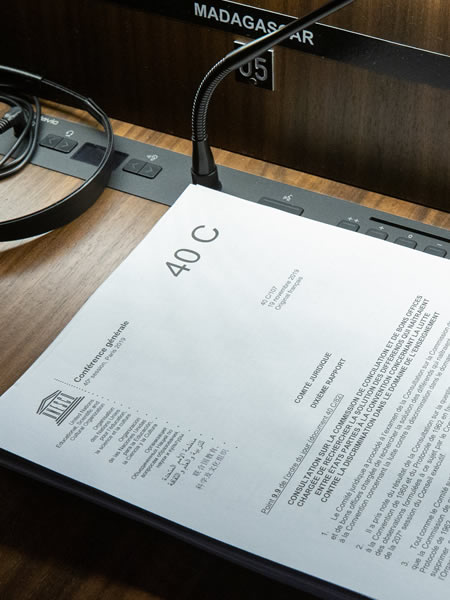
Photos: Closure of the 40th General Conference of UNESCO in Paris, France. 27 November 2019. Images provided by & copyright © UNESCO/Christelle ALIX.
Paris, France, 12 December 2019 — UNESCO’s 40th General Conference concluded after adopting a draft Convention to facilitate student mobility between universities on five continents.
The General Conference, UNESCO’s governing body, meets every two years to establish the Organization’s program and budget. It brings together all 193 Member States of the United Nations Educational, Scientific, and Cultural Organization.
“We are entering a phase of renewal,” said Audrey Azoulay, the Director-General of UNESCO, summing up the fortieth session of the General Conference, which took place from 12 to 27 November. Noting that after more than 20 years of cuts and setbacks, the budget situation had returned to normal, she underlined that, “by accepting an increase in contributions, a rare event in the UN system, Member States have expressed their confidence in the direction given to UNESCO over the past two years.”
As demonstrated by the attendance of so many political leaders, UNESCO is once again a venue for global conversation. Participants included:
Among the decisions taken by UNESCO’s 193 Member States is the adoption of a Convention on Inter-University Mobility, which will enter into force after being ratified by twenty countries. The Convention will foster academic mobility between regions and the establishment of universal principles to improve the recognition of diplomas. It will complement UNESCO’s five regional conventions on the acceptance of higher education qualifications.
At the same time, some 100 ministers of education and as many university representatives participating in the UNESCO Chairs Programme met to promote the emergence of a more inclusive “Global Campus.” The “Global Campus” would facilitate better student mobility by responding to the rapid increase in the number of students enrolled in higher education.
The other major decision of the General Conference concerns the elaboration of an international standard-setting instrument on the ethics of artificial intelligence. Experts selected by UNESCO will be responsible for preparing a project after extensive consultation. Two intergovernmental meetings would be held in 2021 to finalize ethical standards based on fundamental human rights.
Following the ministerial meeting, Mexico announced that it would host a second Mondiacult World Conference on Cultural Policies in 2022. At the first such conference in 1982, the international community had redefined culture as the “set of distinctive spiritual, material, intellectual and emotional features of society or a social group.”
The General Conference also decided to celebrate eight new world days - of Art (15 April), Islamic Art (18 November), African and Afro-descendant Culture (24 January), Engineering for Sustainable Development (4 March), Logic (14 January), Mathematics (14 March), Olive Trees (26 November) and Portuguese Language (5 May). It also decided that the first Thursday in November would be the International Day against Violence and Bullying at School, including Cyberbullying.
The General Conference was also a forum for discussions between young people and around ten government leaders on the theme (Re)Generation: Rethinking Multilateralism with Young Change-Makers. Young people from around the world took part in two weeks of discussions to determine how UNESCO could respond to the climate challenge and youth demands. Participants called on governments to step up their efforts to fight climate change, invest more in education, and take concerted action to ensure that technology serves people and their rights.
Member States have agreed on a budget for 2020-2022 of $534 million (+3%). At Sweden’s initiative, the General Conference amended the Organization’s Constitution to suspend the right to vote - as well as the right to run for election to the Executive Board - of States that are not up to date with their contributions.
At the opening of the General Conference, United Nations Secretary-General António Guterres had warned against the breakup of the international community, claiming that “UNESCO’s action was essential to rally the world.”
|GlobalGiants.Com|

“No culture can live if it attempts to be exclusive.”
— Mahatma Gandhi.

“Culture is the widening of the mind and of the spirit.”
— Jawaharlal Nehru.

“The first duty of government is to see that people have food, fuel, and clothes. The second, that they have means of moral and intellectual education.”
— John Ruskin.
Edited & Posted by the Editor | 8:56 AM | View the original post
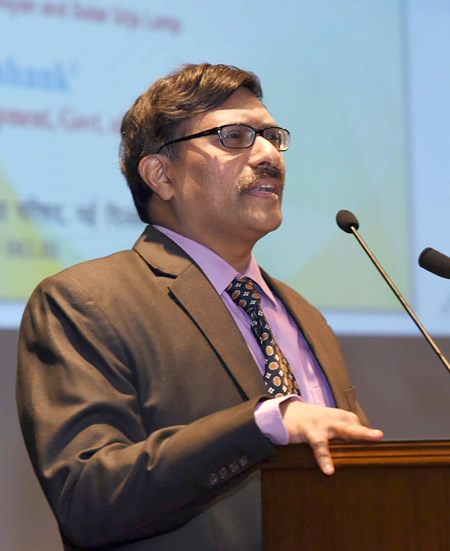
Photo: The Secretary, Department of Higher Education, R. Subrahmanyam, addressing at the Swachh Campus Ranking Awards 2019 of Higher Educational Institutions, in New Delhi on December 03, 2019.
New Delhi, December 3, 2019 — Union Human Resource Development Minister, Ramesh Pokhriyal Nishank, addressed the 3rd Swachhata (Cleanliness) Ranking Award Function through video conferencing in New Delhi today. The 3rd Swachhata Ranking Award process was undertaken by the Ministry of Human Resource Development as a part of the Swachh Bharat Mission of Government of India to promote environmental hygiene in the Higher Education System and beyond. Based on the reports of UGC and AICTE, the HRD Ministry has recommended 48 Universities and Institutions for awards in various categories. The Secretary, Department of Higher Education, R. Subrahmanyam, awarded the selected Universities/ Institutions in AICTE Auditorium, New Delhi.
The Minister said that Swachhata, as a Mission is essential for our living environment, body, and soul. A clean environment will result in a pure mind and elevate the thoughts of our students and teachers towards lofty ideas for the more significant benefit of society. He said that the principle of cleanliness is next to Godliness, and it should govern our day-to-day life. He added that the higher education system is the best mechanism towards achieving success in Swacchh Bharat Mission through the powerful and influential base of 3 crore plus students and teachers in the country.
He further said that the ranking system evaluates various parameters of hygiene like student-toilet ratio, hostel hygiene, hostel kitchen hygiene, availability of water, water conservation measures, campus greenery, and administrative responsibility for cleanliness. The Ministry has formulated the system to generate peer pressure amongst educational institutions to improve their level of campus hygiene and also take up off-campus hygiene activity in nearby villages/surrounding areas.
The Minister expressed his happiness in informing that over the last three years, the response from institutions to the Swachhata Ranking process has been steadily growing. In 2017, 3200 institutions participated; in 2018, it was 6100 institutions, and now in 2019, a total of 6900 institutions participated in the ranking exercise. Therefore, the need for and awareness of maintaining Swachh Campuses and also voluntarily taking up village hygiene activity is now spreading across the Indian Higher Education system with active enthusiasm.
He appreciated the Ministry’s effort to develop clean and green college campuses that would create a healthy study environment for students, thereby stimulating their minds towards higher learning. The Ministry recognizes that it is essential to create an ambiance for learning for the youth of our country who will play a significant role in the economic and social development of our great nation.
Mr. Pokhriyal congratulated the winners in various categories of awards like Residential Universities, Non-residential Universities, Technical Universities, Residential Colleges, and Government Universities.
Following are the Award Winners in the Government Residential Universities Category:
Name of the University — Position
|GlobalGiants.Com|
Edited & Posted by the Editor | 12:54 PM | View the original post


Photo: A part of the Student Center at the Nanyang Technical University (NTU), Singapore, Campus. NTU is ranked number two in Asia. Image Credit: Damien Walmsley.
Discover the top universities in Asia with the QS Asia University Rankings 2020.
London, November 28, 2019 — In the QS Asia University Rankings, an impressive 550 universities feature in this year’s rankings, including 68 new entrants. The National University of Singapore (NUS) remains number one in Asia, with Nanyang Technological University (NTU) leapfrogging The University of Hong Kong (HKU) to take second place. Seventeen different locations are represented in this year’s Asia rankings, although only four regions get featured in the top 10. There’s only one new face in the top 10 this year - China’s Zhejiang University, which rises seven places to take the sixth position. This year’s rankings have been constructed using ten different indicators, which include academic and employer reputation.
QS Asia Top 25
QS Asia Rank— Institution — Country
• QS Asia — INDIA
QS Asia Rank— Institution
The best performing institution from India is IIT Bombay, which drops one place to 34th position. IIT Delhi follows it at 43rd place and IIT Madras on the 50th.
Among the traditional universities, the University of Delhi tops in India. It is now placed 67th in Asia.
Meanwhile, in an exciting evolution, Pakistan’s oldest university, Punjab University Lahore, has secured 195th rank in the QS Asia University Rankings 2020, while its offshoot, Panjab University, Chandigarh, India, could get placed under the 291-300 bracket only.
|GlobalGiants.Com|
Edited & Posted by the Editor | 1:49 PM | View the original post
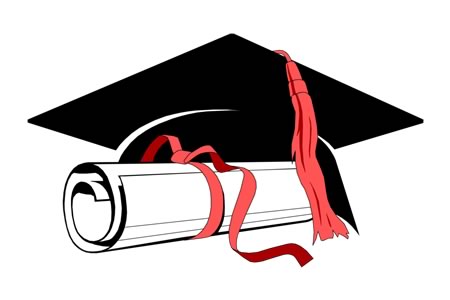
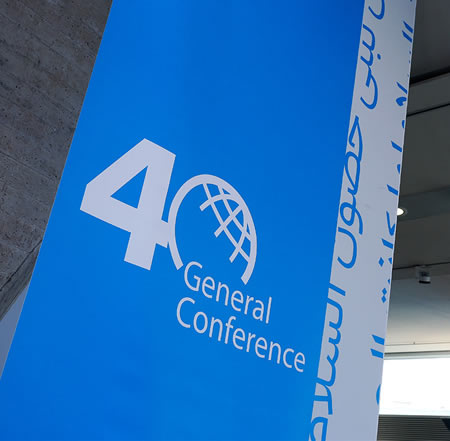
Photo: The 40th UNESCO General Conference in Paris. 25 November 2019. Image provided by & copyright © UNESCO/Fred Di Girolamo.
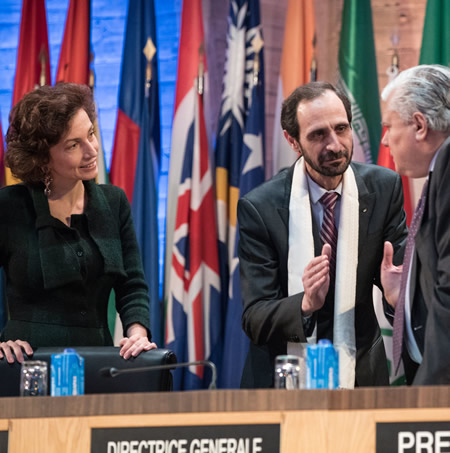
Photo: Scene during the plenary meeting of the 40th UNESCO General Conference in Paris. 26 November 2019. Image provided by & copyright © UNESCO/Marie Etchegoyen.
Paris, France, 26 November 2019 — On 25 November 2019, UNESCO’s Member States adopted the first United Nations convention on higher education when the plenary of the 40th session of the General Conference endorsed the Global Convention on Recognition of Qualifications concerning Higher Education. The new Convention establishes universal principles for recognition of studies and degrees and will improve mobility for the more than 220 million students enrolled in higher education worldwide.
Eight years in the making, the new Global Convention expands the scope of the main principles of UNESCO’s regional recognition conventions to assess foreign qualifications in a fair, non-discriminatory, and transparent manner. It builds on quality assurance mechanisms and sharing of information about higher education institutions and systems, study programs, and degrees. Where the regional conventions only cover mobility between countries within the different UNESCO regions, the Global Convention paves the way for the increasing movement between regions and continents, which already counts for more than half of the 5 million mobile students in the world today.
Although the Global Convention does not impose automatic recognition of foreign qualifications, it lays down the principle that a student qualifying for access to higher education in one country generally will qualify for higher education studies when moving to another country.
The Global Convention also simplifies recognition processes by turning the burden of proof from applicants to recognition authorities. Where in the past, it has been mostly up to students to prove why their foreign qualifications should be recognized, it is now up to recognition authorities to show why they have not granted recognition. Even when the authorities withhold recognition of skills, applicants have the right to appeal.
Furthermore, the general rule is now for recognition authorities to look for similarities to recognize foreign qualifications, rather than rejecting recognition based on insignificant dissimilarities between international and national requirements, as has often been the case before.
The Global Convention includes innovative provisions on recognition of prior learning, partial studies, cross-border education, and non-traditional learning modes such as online or blended learning. With the Global Convention, the obligation to fairly assess the qualifications of refugees who cannot provide sufficient documentation becomes a universal principle. UNESCO is, therefore, piloting the UNESCO Qualifications Passport for Refugees and Vulnerable Migrants to provide the Member States with a tool for assessing undocumented qualifications held by refugees.
The new Convention creates a normative platform for fostering trust among higher education systems. It is a landmark opportunity for the world’s academic communities to embrace a common good and a shared resolve to forge lifelong higher education learning institutions that are at once relevant, dynamic, and inclusive. The Convention will help ensure the right to education of individuals by facilitating access to higher education.
|GlobalGiants.Com|
Edited & Posted by the Editor | 10:59 AM | View the original post
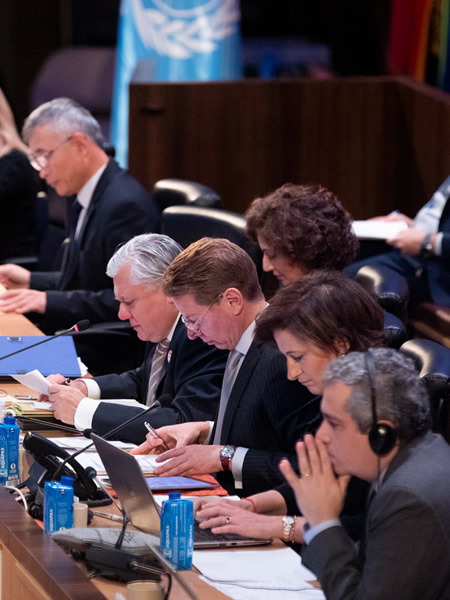
Photo: Plenary meeting of UNESCO General Conference in Paris. 25 November 2019. Image provided by & copyright © UNESCO/Christelle ALIX.
Paris, France, 25 November 2019 — An important step was taken towards quality education and access to information for all, as UNESCO’s General Conference adopted today a Recommendation on Open Educational Resources (OER).
This new Recommendation will support the development and sharing of openly-licensed learning and teaching materials, benefitting students, teachers, and researchers worldwide.
“The Recommendation on OER will contribute to the building of open and inclusive knowledge societies, and the achievement of the UN Sustainable Development Goals,” highlighted Mr. Moez Chakchouk, UNESCO Assistant Director-General for Communication and Information.
OER are learning, teaching, and research materials in any format and medium that reside in the public domain or are under the copyright released under an open license, which permit no-cost access, re-use, re-purpose, adaptation and redistribution by others.
The UNESCO Recommendation will support the creation, use, and adaptation of inclusive and quality OER, and facilitate international cooperation in this field. Its objectives also include the development of supportive policies and the creation of sustainability models for OER.
During the General Conference debates, several Member States from different world regions expressed their support to the Recommendation on OER, underlining its essential role in providing access to quality education on digital platforms. The discussion echoed the critical contribution of OER to the construction of open, inclusive, and participatory knowledge societies.
“I welcome the intersectoral cooperation around the Recommendation,” said Ms. Stefania Giannini, UNESCO Assistant Director-General for Education. “It shows how two Sectors can collaborate and support the Member States.” Ms. Giannini also highlighted that UNESCO had coined the term and concept of OER in 2002.
In his concluding remarks, Mr. Moez Chakchouk, Assistant Director-General for Communication and Information, announced the launch of a Dynamic Coalition to expand and consolidate commitments and strategies in the area of OER.
This Dynamic Coalition reflects the Ministerial Statement for the 2nd World OER Congress and will contribute to promoting and reinforcing international cooperation on the implementation of the Recommendation. UNESCO will work closely to support the Member States and other stakeholders in this regard.
|GlobalGiants.Com|
Edited & Posted by the Editor | 1:33 PM | View the original post
 |
 |
